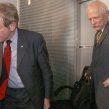
RUSSIA DEFLECTS EUROPEAN CRITICISM WITH THE PRETENCE OF SELF-ISOLATION
Publication: Eurasia Daily Monitor Volume: 2 Issue: 124
By:

The traditional “Russia day” at the Parliamentary Assembly of the Council of Europe is always a lively affair, but last Wednesday, June 22, it came close to full-blown scandal. The 144-page report on Russia’s fulfillment of its commitments to this organization contained more than 400 reservations and accusations of violating basic democratic norms (Lenta.ru, June 23). The Russian delegation, led by Konstantin Kosachev and Mikhail Margelov, gave a good fight in order to soften this criticism, at times taking a cue from Nikita Khrushchev’s behavior at the UN, but also making an emotional plea not to attack Russia that hard on June 22, a day associated with the German invasion in 1941 (Kommersant, June 23). It was all to no avail; the Assembly approved the report and even voted for several amendments requesting the end of financial support to the Lukashenka regime in Belarus and the speedy withdrawal of Russian troops from Moldova, as well as clarifying that the Baltic states were indeed “occupied” (Nezavisimaya gazeta, June 23). In the best traditions of resurrected Soviet diplomacy, Kosachev qualified these amendments as “absolutely unacceptable” (Vedomosti, June 23).
What was remarkable in these heated debates was the lack of emphasis on the traditional issues of human rights violations in Chechnya and the failure to abolish capital punishment, though both were duly reflected in the report. The big issue was Russia’s deep retreat from democracy identified in every direction from the squeeze of independent media to the tight state control over the judiciary to the manipulation of elections and even to hazing in the barracks. European parliamentarians were particularly critical of Putin’s plan to cancel regional elections and appoint governors by decree, but here the Russian team scored a very important point by making sure that the president’s name was not mentioned in this context (Gazeta.ru, June 23). They may have returned to Moscow feeling they had completed a difficult task, but there are hardly any doubts in any European quarters that Russia’s backsliding towards quasi-authoritarianism is not just happening under Putin’s watch but constitutes the core substance of his leadership (Polit.ru, June 23).
For the Kremlin, these condemnations are little more than a minor irritant. Defying Western pressure on Moldova, Moscow sent an emissary from the presidential administration to fine-tune a plan for maintaining a Russian military presence in Transnistria (Kommersant, June 23). Its only response to the attack by the Council of Europe was a threat to halve its contribution to the budget of this organization, which now amounts to 25 million euros (Lenta.ru, June 23). Moscow has adopted the same tactics of financial pressure on the OSCE and, observing the bitter quarrels in the EU on its budget, has few doubts of its efficiency.
What really matters for Putin and his entourage is striking the correct tone at the forthcoming G8 summit in Scotland. Consequently, Vladislav Surkov, the deputy head of the presidential administration and the main architect of “managed democracy,” was recently dispatched with a special PR mission to confirm that the pro-Western orientation was alive and that Putin’s brand of authoritarianism was indeed “soft” and “enlightened” (Gazeta.ru, June 21). Moscow dismisses speculation about its expulsion from this elite club and even finds it appropriate to advance its own criticism of some shortcomings in Western efforts, singling out the “destabilizing” democracy-enforcement efforts in Afghanistan (Kommersant, June 24).
Hydrocarbon power makes Russia so self-confident, and, as the mind-boggling oil prices edge closer to $60 per barrel, it has reasons to believe that its key European partners, which all happen to be importers, would go along with adding a few extra blocs to the Babylonian construct of “a presidential vertical power structure.” For that matter, Norwegian Prime Minister Kjell Magne Bondevik, visiting Moscow last week, was so busy with an oil-and-gas agenda that there was no time for mundane matters like human rights (Vedomosti, June 21). Norwegians are so excited about the prospect of becoming minor partners in the development of the giant Shtockman gas field that the warnings from the World Bank about state interference strangling the fledgling Russian market fall on deaf ears (Kommersant, June 21).
There is, however, one more, rather peculiar nuance in Russia’s bold rejection of Western criticism – the hidden threat to abandon all attempts to engage with the West and retreat into self-isolation. This anti-globalist attitude has long roots in Russia’s tortured history, and there are quite a few outspoken commentators, like Mikhail Leontiev, who seek to exploit the widespread feelings of being treated unjustly for cultivating the philosophy of “our way” (Gazeta.ru, June 22). These ideas gain in popularity – as a quick opinion poll conducted by the popular radio station Ekho Moskvy has shown. After giving the floor to Rene van der Linden, the chairman of the Council of Europe’s Parliamentary Assembly, to elaborate on the Russian debates, its mostly liberal Muscovite audience was asked: Should Russia remain in the European organizations? Of the 3,765 responses, as many as 41% said “No” (Ekho Moskvy, June 23).
Western policymakers realize that Russia’s self-isolation would be a recipe for disaster. Therefore, after devastating criticism of the current course of Putin’s “reforms” during recent hearings in the U.S. Senate, the conclusion was reached that the only option is to continue efforts aimed at engaging this disagreeable partner (Kommersant, June 23). What makes the course of self-isolation worrisome is that it appears entirely compatible with internal curbs on democracy. However, in real life, Putin’s siloviki have no intentions whatsoever of isolating themselves from Western resorts or bank accounts or elite schools for their children. This bluff would be inevitably called, and perhaps even before the oil bubble bursts.




